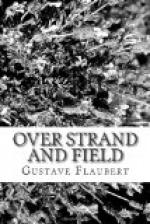A cart drawn by oxen appeared and halted in front of the church. It held a corpse, whose dull white feet protruded from under the winding-sheet like bits of washed alabaster, while the body itself had the uncertain form peculiar to dressed corpses. The crowd around was silent. The men bared their heads; the priest shook his holy-water sprinkler and mumbled orisons, and the pair of oxen swung their heads to and fro under the heavy, creaking yoke. The church, in the background of which gleamed a star, formed one huge shadow in the greenish outdoor atmosphere of a rainy twilight, and the child who held a light on the threshold had to keep his hand in front of it to prevent the wind from blowing it out.
They lifted the body from the cart, and in doing so struck its head against the pole. They carried it into the church and placed it on the stretcher. A crowd of men and women followed. They knelt on the floor, the men near the corpse, and the women a little farther away, near the door; then the service began.
It did not last very long, at least it impressed us that way, for the low psalmodies were recited rapidly and drowned now and then by a stifled sob which came from under the black hoods near the door. A hand touched me and I drew aside to let a bent woman pass. With her clenched fists on her breast, and face averted, she advanced without appearing to move her feet, eager to see, yet trembling to behold, and reached the row of lights which burned beside the bier. Slowly, very slowly, lifting up her arm as if to hide herself under it, she turned her head on her shoulder and sank in a heap on a chair, as limp as her garments.
By the light of the candles, I could see her staring eyes, framed by lids that looked as if they had been scalded, so red were they; her idiotic and contracted mouth, trembling with despair, and her whole pitiful face, which was drenched with tears.
The corpse was that of her husband, who had been lost at sea; he had been washed ashore and was now being laid to rest.
The cemetery adjoined the church. The mourners passed into it through a side-door, while the corpse was being nailed in its coffin, in the vestry. A fine rain moistened the atmosphere; we felt cold; the earth was slippery and the grave-diggers who had not completed their task, found it hard to raise the heavy soil, for it stuck to their shovels. In the background, the women kneeling in the grass, throwing back their hoods and their big white caps, the starched wings of which fluttered in the wind, appeared at a distance like an immense winding-sheet hovering over the earth.
When the corpse reappeared, the prayers began again, and the sobs broke out anew, and could be heard through the dropping rain.
Not far from us, issued, at regular intervals, a sort of subdued gurgle that sounded like laughter. In any other place, a person hearing it would have thought it the repressed explosion of some overwhelming joy or the paroxysm of a delirious happiness. It was the widow, weeping. Then she walked to the edge of the grave, as did the rest of the mourners, and little by little, the soil assumed its ordinary level and everybody went home.




